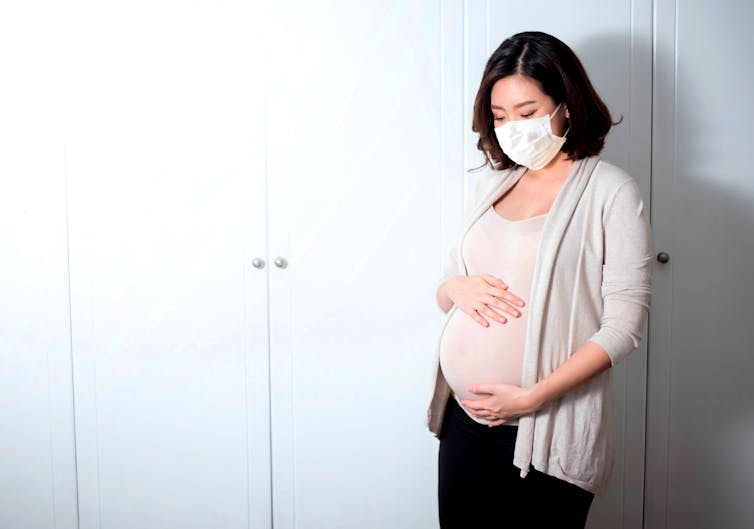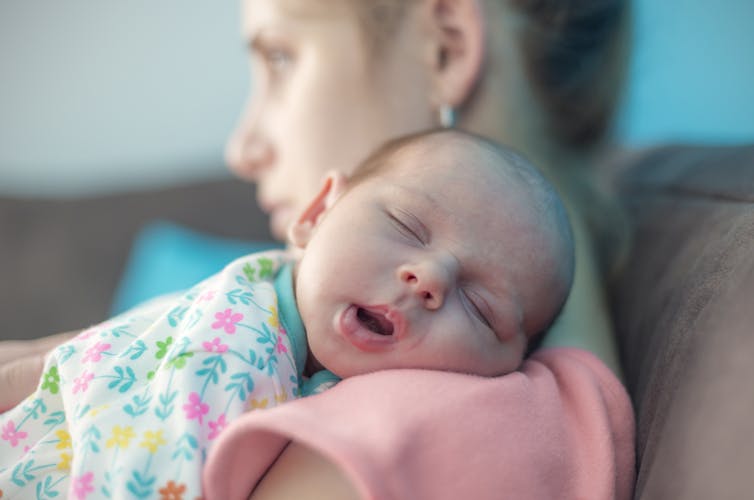
Kiera O'Neil, Mount Saint Vincent University and Jennifer E. Khoury, Mount Saint Vincent University
The COVID-19 pandemic brought changes to many people’s daily lives, and resulted in high levels of mental health problems. The pandemic was especially difficult for pregnant people. New research investigates the long-term impact of the pandemic on pregnant and postpartum people and their infants.
There is concern that the difficulties experienced by pregnant people during the pandemic could be related to issues down the road. Experiencing disaster-related stress during pregnancy, like that felt during the January 1998 ice storm in Québec, can have a lasting impact on parents and their children. How can we help people begin to recover from the pandemic and support pregnant and postpartum people during future large-scale disasters?
Research over the last two years
The COVID-19 Wellbeing and Stress Study is an ongoing study conducted in partnership between researchers at Mount Saint Vincent University, McMaster University and Toronto Metropolitan University. The research team began following 304 pregnant women from Ontario in the spring and summer of 2020.
Participants completed surveys during pregnancy, and at six weeks, six months and 15 months postpartum.
We wanted to know how the COVID-19 pandemic affected access to prenatal care and how self-reported anxiety, depression and stress affected birth outcomes. We also wanted to know how participants’ mental health fared as the pandemic continued, and what could potentially protect them from the negative impact of the pandemic.
Prenatal disruptions

According to study participants, access to social and health services during their pregnancies was disrupted.
Almost all participants (91.7 per cent) were not allowed to bring a support person to their prenatal appointments at some point during pregnancy (in 2020). Nearly one-quarter (23 per cent) had prenatal appointments cancelled, and almost half (47.9 per cent) had trouble accessing prenatal classes.
Our research looked at the effects of these disruptions to care on mental health. Disruptions were linked to elevated levels of self-reported anxiety and depressive symptoms. These results are similar to the findings of a national study.
Birth experiences
Disruptions also extended to birthing experiences. The majority (60.8 per cent) of participants experienced a change to their birth plan, affecting things like delivery location, support people or child-care arrangements for other children.
More than one-quarter (28 per cent) of parents reported that their infant experienced problems during delivery, and nearly one-half of infants (46.6 per cent) had at least one problem after birth, such as jaundice or difficulties breathing. Importantly, however, infant birth weight and rates of preterm birth were similar to Canadian rates prior to the pandemic.
We then looked at how psychological factors were associated with birth outcomes. Some participants self-reported pregnancy-specific anxiety — things like feeling anxious about the health of the baby, miscarriage and experiencing difficulties during birth. These feelings were associated with lower infant birth weight, preterm birth and more infant birth problems.
This was not surprising. Other research has shown that mental health problems during pregnancy are associated with these same adverse birth outcomes.
Long-term impact

We followed the study group for more than a year after they gave birth. Participants had reported high rates of anxiety, depressive and stress symptoms during pregnancy, and these rates declined over the first 15 months of their infants’ life. However, participants did continue to experience these symptoms in the postpartum period.
On average, from pregnancy to the postpartum, more than half of participants (50 to 58 per cent) self-reported high levels of depressive symptoms. Up to one-third (24 to 36 per cent) reported moderate to severe anxiety symptoms. High levels of stress were also reported (13 to 18 per cent).
In comparison, prior to the COVID-19 pandemic, global postpartum depression rates are estimated at 14 per cent.
Importance of social support
Despite these high numbers, one thing was clear: participants who were able to seek support from their family, friends and significant other had lower levels of anxious, depressive and stress symptoms during pregnancy. Those who were able to use other effective coping strategies (for example, reframing thoughts, problem solving and seeking support) showed lower mental health and distress symptoms. The importance of social support to protect against the negative impact of the pandemic has been noted by others as well.
These results tell us that we need more, easily accessible mental health and social support services for pregnant and postpartum people and their families. Social support and mental health programs are essential in anticipation of future — possibly long-lasting — public health crises.![]()
Kiera O'Neil, Manager, Developmental Psychobiology Research Centre, Mount Saint Vincent University and Jennifer E. Khoury, Assistant Professor, Tier II Canada Research Chair in Interdisciplinary Neuroscience, Mount Saint Vincent University
This article is republished from The Conversation under a Creative Commons license. Read the original article.

